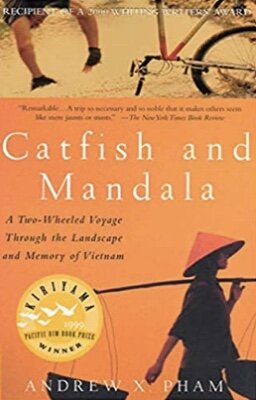Catfish and Mandala by Andrew X. Pham (Picador)
Back in the 13th century, a Chinese diplomat named Chou Ta-Kuan may have been the first travel writer to voice the phenomenon that the 20th century called culture shock. Brought up to believe his country was the measure of all things, he was unsettled by the glory and splendor of the Khmer empire’s capital, Angkor Wat. Like many travelers who ventured into unknown worlds long after his death, Chou offset his rumpled world view with scathing derision of habits that differed from his own. This is a palliative that contemporary travel writers continue to use as an antidote to discomfit, from Paul Theroux to an obscure Englishwoman who made the ill-fated decision to make her home on Pitcairn Island and lived to tell the tale.
Andrew X. Pham was broadsided by culture shock. He never expected it to happen when he went to Vietnam. He was returning to a place where he had lived for the first half of his childhood. He was coming home.
Pham’s parents left when Vietnam was still emerging from its war with the U.S. From the time he was ten, Pham lived with a new language, new customs, and memories of his old home. Nearing the end of his twenties, he’s lost his job, his apartment, and a sister who dies after choosing to become his brother. Faced with the prospect of moving in with his parents, he takes his savings, his bicycle, and a few clothes and gets on a plane to Vietnam. His plan is to bicycle from Saigon to Hanoi and use the story of his journey to propel his career as a freelance writer. He knows the language, he knows the codes of behavior, he’s a seasoned cyclist. What could go wrong?
Thomas Wolfe could have answered that question. Pham enters a country where his memories have been eradicated during the past decades of rebuilding and change. Without knowledge of the progress that’s taken place since the end of the war, he’s disgusted by the poverty that surrounds him. He discovers he’s no longer seen as Vietnamese; he’s a Viet-kieu, one who left for the safety and comfort of another country. Worse still, he’s a Viet-kieu who came back with no gifts for relatives and who is so careful with his money that he’s perceived as stingy. Suddenly Pham is an outsider and an unwelcome one at that.
Rejected by the people he thought were his own, Pham’s vision fixates on the misshapen, the crippled, the women with with “hungry vacant eyes,” men who “perk up like coyotes” when they see him pulling into town in his American clothes, on his American bicycle. He meets a taxi-dancer whom he thinks he could love, until she discovers he won’t be her avenue to a green card. In Hanoi he becomes the patron of a boy who lives on the streets and is passed on from traveler to traveler. He leaves town without saying goodbye.
“The sight of my roots repulses me. And that shames me deeply.” Pham admits. The only monument that impresses him are the tunnels at Cu Chi and the kindnesses shown him as he makes his journey seem to be outweighed by the anger and envy that he excites along the way. One old man takes him home, gives him a place to sleep, and shares meals with him, telling him “Here is my home, my birthland, and my grave.” A younger man tells him, “Some call you the lost brothers. You are already lost to us.” And Pham at the end of his journey realizes “my search for roots has become my search for home,” and that home is not Vietnam.
His honesty in recounting his multi-leveled odyssey is stark and blunt; the story he tells is a young man’s way of looking at the world. At the same time, this is a tale of adventure through in an unknown land, which Pham describes without overlooking its beauty. His descriptions are riveting and appreciative glimpses of the natural world and his bicycle trip rank right up there with the worst journeys ever taken, in terms of pain and injury. His travels are underpinned with family history and tragedy, both in Vietnam and within the U.S., making readers wonder if the price of immigration may be too high a cost in the long run.~Janet Brown
